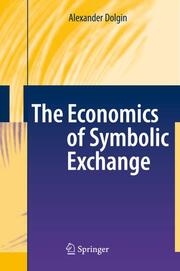-
Zusatztext
-
Alexander Dolgin's Economics of Symbolic Exchange is in reality not one but three books, and although these semantic layers are interlinked, the reader will need to choose between the different vectors and modalities. One clearly evident dimension is research. Certain authors introduce quite new intellectual approaches into scienti?c debate. This requires a special frame of mind and a searching curiosity about social reality. Carl Gustav Jung identi?ed a p- nomenon which he called systematic blindness: when a science reaches a stage of maturity and equilibrium, it categorically refuses, from a sense of self-preservation, to note certain facts and phenomena which it ?nds inconvenient. In Alexander D- gin's book whole complexes of such "non-canonical" material are to be found. Here are just a few examples: ?le exchange networks, through which digital works of art are spread through the Internet; bargain sales of fashionable clothing; the paradox of equal pricing of cultural goods of varying quality; and a discussion of whether - tronage or business has the more productive in?uence on creativity. Obviously, not all the issues Volginraises are totally new, but brought togetherand examinedwithin an elegant logical framework of informational economics, they pose a challenge to scienti?c thinking. Such challenges are by no means immediately or, in some cases, ever acclaimed bythescienti?cestablishment. J. K. Galbraith,forexample,agreatAmericaneco- mist, whose works are read throughout the world, who introduced a whole range of crucially important concepts, the director of John F.
-
-
Kurztext
-
The book addresses the mechanisms of culture in the digital age. Its author, professor at Higher School of Economics, tackles a number of highly relevant issues: the modus operandi of culture in a market environment, the role of money in the process and some methods intended to help consumers in the choice of cultural goods which best meet their tastes in a situation of ever increasing commercial cultural output. The economics of symbolic exchange is a branch of economic science dealing with "personality resources" such as free time, attention, emotions, etc. At present, these assets are virtually unaccounted for, nor used, due to the inherent impossibility of their measurement. As a result, more often than not, the economic thought entering the field of culture proves quite helpless. The book provides ample factual evidence relating to a whole range of cultural markets: record industry, book publishing, fashion, network resources and others. Special mention is made of the "grey" segments of the economy, such as the role of pirates and illicit dealers, or the activities of semi-legal file sharing services enabling free downloads of music and video material in the cyberspace. These glimpses into the "grey" territory expose holes in the "white" markets and contest certain myths. The material collected in the book comes down to quite a novel outlook on numerous phenomena of contemporary culture. The key purpose of this work is to introduce into practice some new management tools which are essential for the success of any economic changes in the field of culture, including recommendatory services operating as a social institution of expert consumer analysis of cultural goods and services.
-
-
Autorenportrait
- Alexander Dolgin is Professor and head of the Chair of Economics of Culture at the State University - Higher School of Economics, Moscow. He has published two books and over one hundred research papers and popular articles. The main focus of his research interests is the institutional economics of culture, which covers diverse topics such as the deteriorating cultural selection processes, the economics of creative reputations, the theory of the welfare of culture, the economics of the copyright and many others.
Detailansicht
The Economics of Symbolic Exchange
ISBN/EAN: 9783540798828
Umbreit-Nr.: 1946802
Sprache:
Englisch
Umfang: xxi, 503 S., 53 s/w Tab.
Format in cm:
Einband:
gebundenes Buch
Erschienen am 06.10.2008
Auflage: 1/2008


